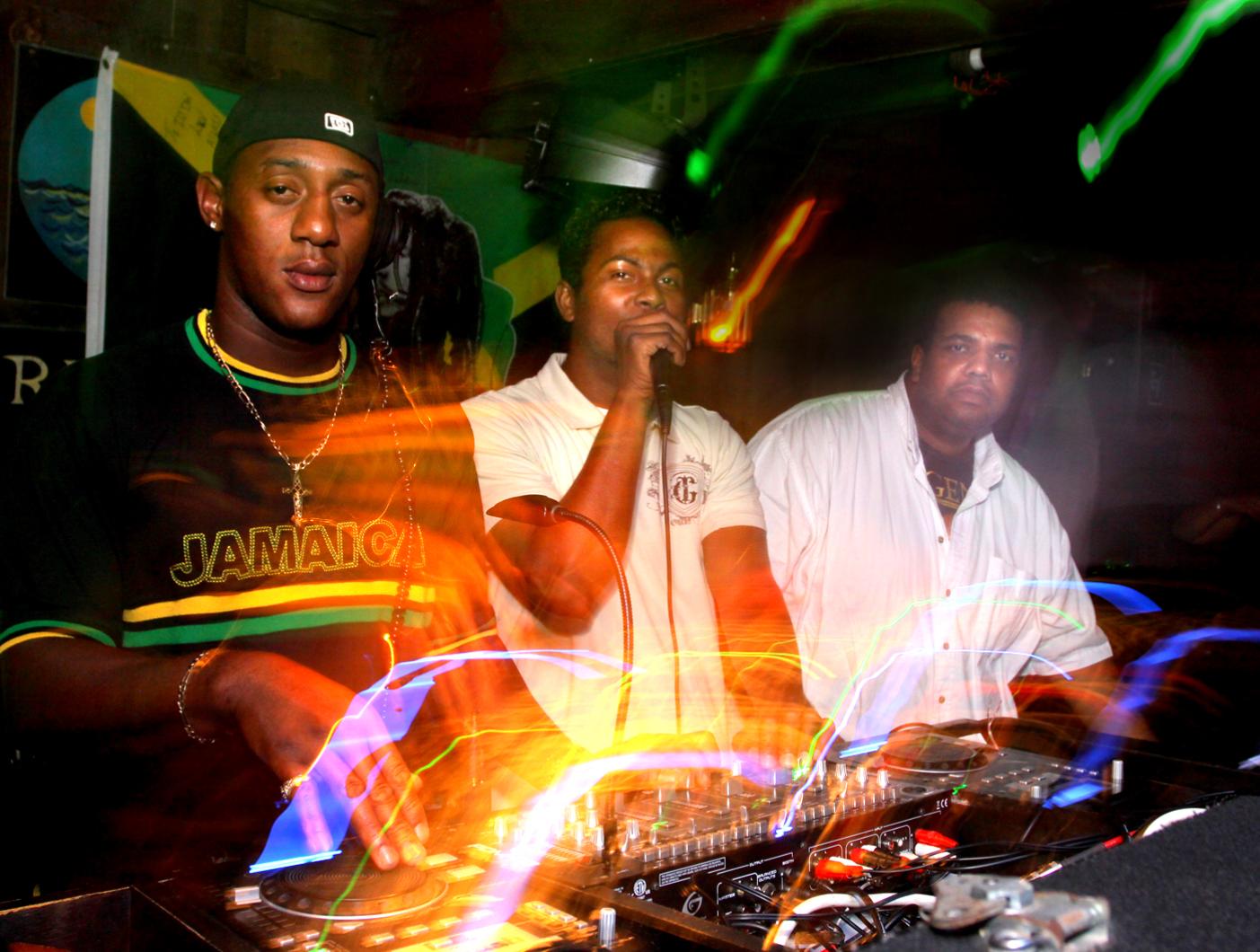At 11 p.m. on Sundays in summer reggae music rumbles underground, three concrete steps beneath Circuit avenue in Oak Bluffs at the Dive Bar. The boom and song of Peter Tosh, Mavado and Sean Paul, earlier sealed surreptitiously in this sunken saloon, swell and rupture to the streets as the party peaks in size and vibrancy.
Inside the basement bar is darkness, pure except for the hazy copper glow of 15 small lanterns fastened to the ceiling and walls. On reggae night, a cast of dreadlocked Jamaicans, camera-clutching American tourists and year-round Vineyarders assemble in the black room, crowding around turntables manned by deejay D.Dub and his coselectors — the men who compile and monitor the beats that inspire the sensual, uninhibited dancing that lasts into the early hours of Monday.
Some in the crowd have stumbled upon the nightspot, but many regulars saunter in each Sunday. Most wear an item that boasts an alliance with reggae: a silhouetted marijuana leaf or the red, gold and green stripes of the Rastafarian flag. Regardless of origin, all of them dance.
This is Jiggy Sunday, a weekly dose of authentic reggae music served to a crowd diverse in age, race and rhythmic talent.
“There are a lot of Caribbean people on this Island. This is something for the Caribbean people,” says Richard Anderson, 30, a Kingston-born reggae fan now living in Oak Bluffs. “Maybe I don’t come out on a Friday or a Saturday, but on a Sunday, I am here.”
Stationed between towering speakers and a wall-hung Rastafarian flag adorned with a black and white image of Bob Marley, a three-man tribe mans the music booth that powers the night. Through their engineering, the sounds of reggae spill onto the dance floor in segments alternating between a chilled-out rock steady style and the pulse-jolting dance hall variety.
The deejays rotate duties at the start of each new segment. One plays the music and listens for quality. Another talks over the track in Jamaican patois, an English-African Creole tongue, to hype the party. In a quick, melodic vibrato, he growls lines like “Big up, Martha’s Vineyard!” The remaining deejay selects music for the next segment from a collection of tracks stored on compact discs and in a digital library. Together, this clan of three forms a sound system.
A musical mechanism established in the 1950s by Jamaican emcees in the ghettos of Kingston, the sound system was historically a party generator and a moneymaking scheme. Deejays could trade poverty for popularity and prosperity by spinning the newest reggae music and attracting the largest crowd — often drawing throngs of thousands to gather in fields dubbed dancehalls.
Aesthetically, reggae night at the Dive Bar is a vastly different kind of dance hall. But the style and energy of Jiggy Sunday is bona fide Jamaican.
“Only true Jamaicans or people who have spent a lot of time in Jamaica would know some of these songs, but all sorts of people come and they love it,” says Dive Bar manager Robyn Joubert. She adds, “People come every week. It’s like their night, every Sunday. And nobody comes out until after 10:30 p.m. . . . Some of them have kids. Even single girls leave their kids at home because Sunday is their night.”
“Jamaican dance is different from the way Americans dance,” explains headline deejay Dwight (D. Dub) Gardner, a Jamaican-born emcee now living in Vineyard Haven. “It’s involved and it’s sexy. The Americans come to see it.”
On Martha’s Vineyard, a Jamaican population with an affinity for reggae music thrives. But reggae is a genre that is universally infectious. At the Dive Bar, both cultural reggae and the popular reggae that plays on American radio pours from the speakers to please a club full of folks from many different backgrounds.
“We have a saying in Jamaica that reggae is the heart of the people,” says 30-year-old Califfe Singh, one of the deejays of the night. “It’s a revolutionary kind of music.
“It’s the message and it’s the beat that draws people . . . a lot of hippies are drawn to reggae because of the weed, but I think it’s the message of religion and justice and the message of oneness and of equality of everybody that draws people to reggae.”
On the dance floor, darkness cloaks faces and drowns hesitations. When a camera flashes, the room is momentarily washed with a light that displays the scene: grinning couples rocking on their heels, shaking hands fanned in the air beside each of their ears; singles dancing the Dutty Wine with strangers; bodies linking, rubbing together and splitting.
“Sunday night is always packed,” says Omar (OLJ) Jowrey, 29, the Dive Bar’s bouncer and a Jamaican-born reggae and gospel artist who is spending the summer on the Vineyard.
The crowd, he says, is always charged, but seldom unruly.
“You know, when somebody has a little too much to drink, they try to one-up someone, and if you’re dancing, you don’t want to be one-upped.”
Few in the Jiggy Sunday swarm spend the evening on bar stools. Even fewer clutch bottles while they dance. It would be a hindrance. The movements induced by reggae music engage every body part in dance.
“Every Sunday, come see me sweatin’ here on the floor,” says Sabrina Brooke of Edgartown during a midnight cigarette break outside the bar.
“This is what you want to do,” interjects her friend and Jiggy Sunday sidekick Carla Boyd, also of Edgartown.
Ms. Boyd drops her body low to the sidewalk and begins to swing and shake her way back up in demonstration. “It’s the music,” she says breezily. “It all makes you move.”






Comments
Comment policy »